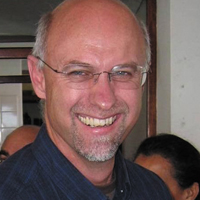 The beautiful city of Cape Town rests at the foot of the magnificent Table Mountains that cross the southern tip of South Africa. This scenic city was founded in 1652 as a supply depot for Dutch ships; it is the legislative capital of the nation, and the home of the Bible Institute of South Africa. The institute faces Kalk Bay on the east side of the crescent shaped peninsula that extends to its end at the Cape of Good Hope. The Bible Institute is a small, well-known, and evangelical Bible college that recently celebrated its eighty-fifth Anniversary. Though its student body is primarily from the African nations, the institute attracts students worldwide who want to be equipped for cross-cultural ministry on the mission field or in the local church. Peter W. Smuts has taught hermeneutics, New Testament interpretation, and undergraduate-level Greek at the institute since completing his studies at Westminster Seminary.
The beautiful city of Cape Town rests at the foot of the magnificent Table Mountains that cross the southern tip of South Africa. This scenic city was founded in 1652 as a supply depot for Dutch ships; it is the legislative capital of the nation, and the home of the Bible Institute of South Africa. The institute faces Kalk Bay on the east side of the crescent shaped peninsula that extends to its end at the Cape of Good Hope. The Bible Institute is a small, well-known, and evangelical Bible college that recently celebrated its eighty-fifth Anniversary. Though its student body is primarily from the African nations, the institute attracts students worldwide who want to be equipped for cross-cultural ministry on the mission field or in the local church. Peter W. Smuts has taught hermeneutics, New Testament interpretation, and undergraduate-level Greek at the institute since completing his studies at Westminster Seminary.
Dr. Smuts was born to parents of European descent that raised him in apartheid-era South Africa. Today, South Africa has a population of about forty-five million people with its ethnic diversity evident in eleven official languages of which English is spoken in the home by less than ten percent of the populace. Of the eighty percent calling themselves “Christian,” about twenty percent consider themselves to be evangelical, roughly twenty-five percent Charismatic, and around thirty-five percent belong to small independent churches. Peter and Dagmar have been married for twenty-five years, they have four children, and they are all members of the Church of England in South Africa.
Today the church in South Africa is still grappling with the issue of racial integration. While there are no legal barriers to this process, there are many challenges presented by socio-economic and cultural obstacles. These challenges are compounded by the problems associated with widespread poverty, crime, and the AIDS pandemic. Not surprisingly, a so-called health-and-wealth Gospel message has become popular in some churches. Moreover, one of the rather obvious legacies of apartheid is a poorly trained leadership in the majority of local churches, which is the consequence of years of limited access to quality theological education and skills development for the vast majority of the population. However, these challenges also provide opportunities for the church. Though South Africa struggles with many problems, Dr. Smuts is grateful that he has been called to serve God in a country where there is freedom to gather as God's people for worship and ministry of the Word.
Peter cannot pinpoint the exact day he was converted. He had attended church for many years and made a commitment to Christ, but it was only as a law student at the University of Cape Town that his life began to reflect his dedication. It was during those years that he was introduced to the Reformed Faith and grew to love its great doctrines. It was not too long after this that he made the transition from “law to grace,” so to speak, and after a number of years of Christian service, the Lord opened the door for Dr. Smuts to do further theological study in the United States. The seven years of study in America were filled with many wonderful stories of God’s provision to his sojourning family along with the establishment of several new and lasting friendships. After receiving the MAR at Westminster Seminary, California, his family moved to Philadelphia where his dissertation on the Olivet Discourse in Luke 21 contributed to his being granted the PhD in 1996. During these years of study, he was introduced to the discipline of Biblical Theology, which he believes facilitated a deepened and broadened understanding of the Word of God and his Christian faith. Peter counts it a privilege to have been taught by faculty who modeled the truths that they taught and challenged him to be rigorous and accurate as he analyzed the Scriptures. As he expresses it himself, “I am truly grateful to God for the opportunity to study at WTS, a privilege few South Africans have had,” and “I have learned that our students must not only be taught the truth, but must also be inspired by the truth to obey it. It is exciting to see God's Word transforming the thinking and the lives of the students and equipping them for Kingdom service around the globe.”